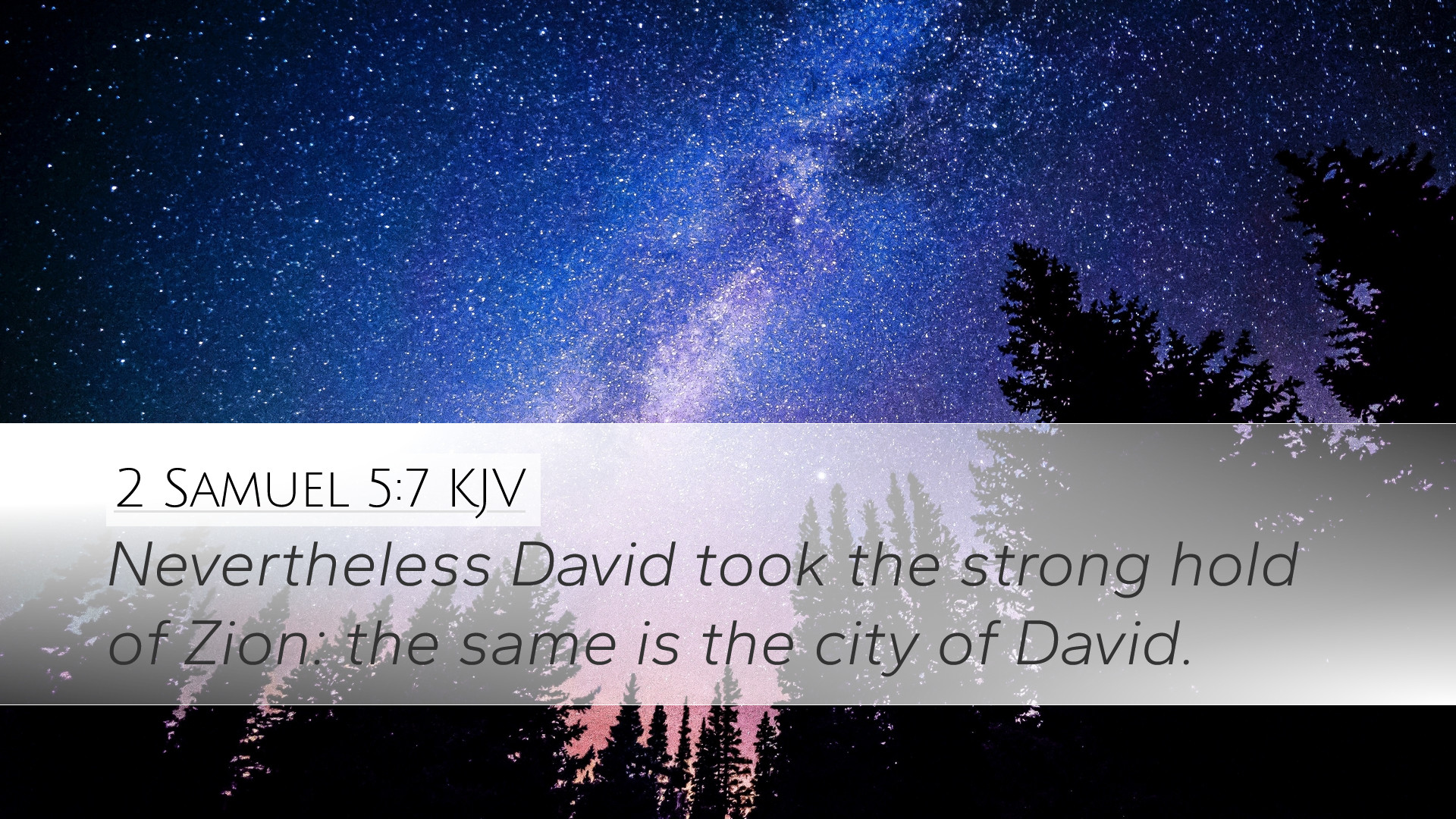Commentary on 2 Samuel 5:7
Bible Verse: "Nevertheless, David took the strong hold of Zion: the same is the city of David."
Introduction
The verse from 2 Samuel 5:7 marks a significant moment in the trajectory of King David's reign and the establishment of Jerusalem as the political and spiritual heart of Israel. This commentary synthesizes insights from renowned public domain commentaries, providing a comprehensive understanding of this pivotal biblical event.
Historical Context
- Transition of Power: By this time, David had been anointed king over Israel after the death of Saul. The reference to the "strong hold of Zion" indicates the geographical and political importance of this location.
- Jebusite Opposition: Jerusalem, known then as Jebus, was inhabited by the Jebusites. David's conquest symbolized not only a military victory but also the unification of the tribes of Israel under his rule.
The Strong Hold of Zion
Symbol of Authority: The stronghold, represented here as Zion, is emblematic of God's chosen place for His people. As noted by Matthew Henry, this location becomes reflective of God's covenant with David and His people.
Spiritual Significance: Albert Barnes emphasizes that Zion is not only a stronghold but also a spiritual center, symbolizing peace and divine favor. The act of David taking Zion signifies the establishment of a divine authority and presence among His people.
David's Leadership and Strategy
- Military Strategy: David's approach to the conquest of Zion is a study in military insight, as he utilized the geographical advantages of the city. Adam Clarke comments on David's savvy in overcoming fortified cities, showcasing strategic planning combined with divine guidance.
- Symbol of Unity: This act was instrumental in uniting the tribes of Israel, strengthening David’s authority as king. By taking Zion, David rallied the people around a common stronghold, enhancing their national identity.
Divine Favor and Covenant
Fulfillment of Promises: The conquest of Zion is part of the broader theme of God's faithfulness to His covenant. Matthew Henry points out that this event is indicative of the fulfillment of God’s promises to Abraham, Isaac, and Jacob concerning the land and their descendants.
Blessing Upon Leadership: Albert Barnes also notes that God's support of David in this conquest is a prelude to further blessings upon his reign, a testament to the importance of divine favor in leadership.
Theological Insights
- God's Sovereignty: The taking of Zion illustrates the sovereignty of God in human affairs. God raises leaders like David to fulfill His purposes. Adam Clarke emphasizes that God's choice of David illustrates His mysterious ways in appointing rulers.
- Significance of Place: Zion holds theological implications for future generations, becoming synonymous with the presence of God among His people. The establishment of Jerusalem foreshadows the ultimate significance of this city in biblical prophecy.
Conclusion
2 Samuel 5:7 is not merely a historical account but a profound testament to God's providential care and the establishment of His kingdom on earth. This verse encapsulates themes of leadership, divine sovereignty, and the importance of place in God’s plan for His people.
As leaders, students, and scholars of the Word meditate on this passage, may they draw insights on the importance of divine guidance, the significance of our "strongholds," and the unifying power of a shared identity in Christ, reflected in the communal experience of worship and service.


